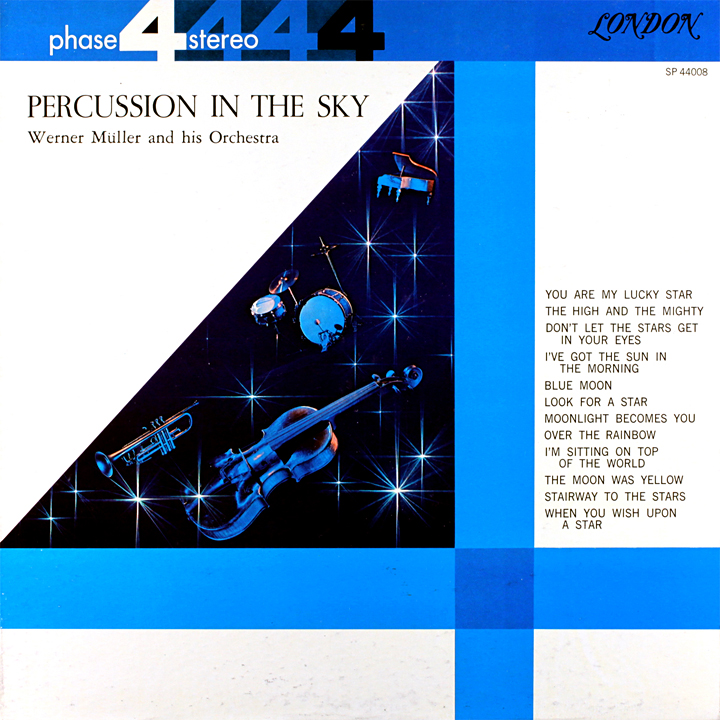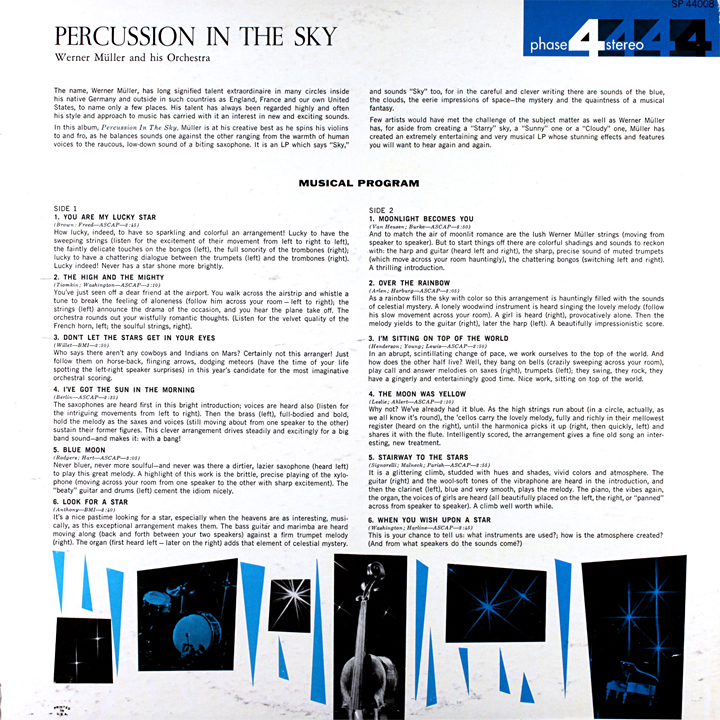In early spring of this year, I returned to my hometown for a short visit with family and friends. During the visit, I managed to collect two recordings of my youth, one of which is the album I can pinpoint as having been instrumental (*snicker*) in awakening my interest in sound.
Werner Müller and His Orchestra’s “Percussion In The Sky,” is a doo-doo record if there ever was one. “Doo-doo” because that is the main vocalization of the singers as they fill out their parts of the melody, a cornball approach fans of kooky, vintage lounge music would both recognize and appreciate if, perhaps, alone.
I think I was around 6 or so when my dad played a track off this record that I remembered as being titled “Cowboys and Indians On Mars,” likely because that is how it is described on the back of the record sleeve. I have since learned that it is a cover of “Don’t Let The Stars Get In Your Eyes,” written by Winston L. Moore (aka Slim Willet).
The track fascinated me not because of the jouncy, cornpone gumbo Werner and his “orchestra” shovel liberally throughout but rather the sound effects: galloping horses, hand-to-hand mayhem, cannon balls launching from one speaker to explode in the other. Hearing it once, I asked my father to play it again and commenced dashing back and forth between the speakers in order to follow the cavalry and ordinance.
My father still owns the record and allowed me to borrow it in order to transfer it to the digital realm. Listening to it again now, the first time since the time described above, at an age far older than my father was, then, and knowing what I know about his tastes, I am amazed he owned it.
The album is a vehicle both for music and demonstrating Decca/London’s “Phase 4 Stereo.” Phase 4 Stereo is a multi-track recording technique with a penchant for panning sounds from one speaker to the other in order to give the listener the illusion they are listening to a stereo recording … which they are. On this album, at least, Werner’s music is of a canon with Esquivel’s, but it feels a bit more forced and artificial; a game stab at the genre. With the inclusion of sound effects, it’s a shade off Spike Jones. My believing the recording to be terrible cheese doesn’t mean I hate it. In fact, I may even order myself a copy. Whoops – I already did.
I am still fascinated with sound effect collections, stereo-testing and demo recordings, experimental, ambient, and avant garde music, and have my own ideas for such compositions. It is easy for me to trace my enthusiasm back to the experience I had with this record, not necessarily as the source of my continued interest in sound but as one of the keys. The impression it left remains strong some 40 years after. It rang out and in me found a sympathetic vibration.
While music was a part of my early homelife, I felt fairly early on that I wanted – and received – a bit more from it than many of those around me; not just from the music but sound in general.
In particular I loved hearing a needle going onto a record: the soft bump of the stylus coming into contact with the vinyl surface followed by the light, almost inaudible, smooth sound of the needle gliding through the unpopulated lead-in groove, accompanied by the occasional crisp pop of static or dust. In many instances, I found the eventual start of the music to be an intrusion into what had, seconds before, been the perfect aural experience!
Perhaps influenced by the cartoons, I saw as well as heard music; it was not just aural but visual. Along with my fascination with words, sounds meant things, meant movement, meant ideas, both abstract and concrete.
Not too long after running back and forth between those speakers to the sounds of the cannon fire, I was given a tape recorder of my own that I used to not only record the japes of myself and my friends but also everyday sounds like the creak of a door or a toilet flushing. The sound waves of that moment in time, captured on magnetic tape at the push of a button, were irresistible to me and the possibilities seemed endless. Imagine my first encounter with the concept of multi-tracking …
The mix tapes of my teen years often included short snippets of my own sound recordings inserted between the songs. I used the noises to link the tracks together, as I’d heard bands like Pink Floyd do, and felt that they could sometimes both flesh out and ground the tracks, if in ways the producers never imagined. My ipod has hours of sound effects on it and it brings a smile to my face when the shuffle plays one of these snippets between the songs.
Despite the effect of and history I have with the Werner Müller record, hearing “Don’t Let The Stars Get In Your Eyes” again did little to revive the feelings it once caused in the maggot-me. As previously mentioned, the tune is not particularly gratifying, nor had I remembered much about it beyond a general memory of the cannons. I have since heard far more interesting uses of sound in, around, or without music. Instead, listening again, I was more able to imagine that room, that time, the way that little boy must have looked and felt as he reacted simply and innocently to the delight these sounds generated within him. Further, I reflect upon the passive way I now enjoy sound; my dusty instruments; my mothballed recording equipment; my silent soul.
Brother, I can see your skull …


